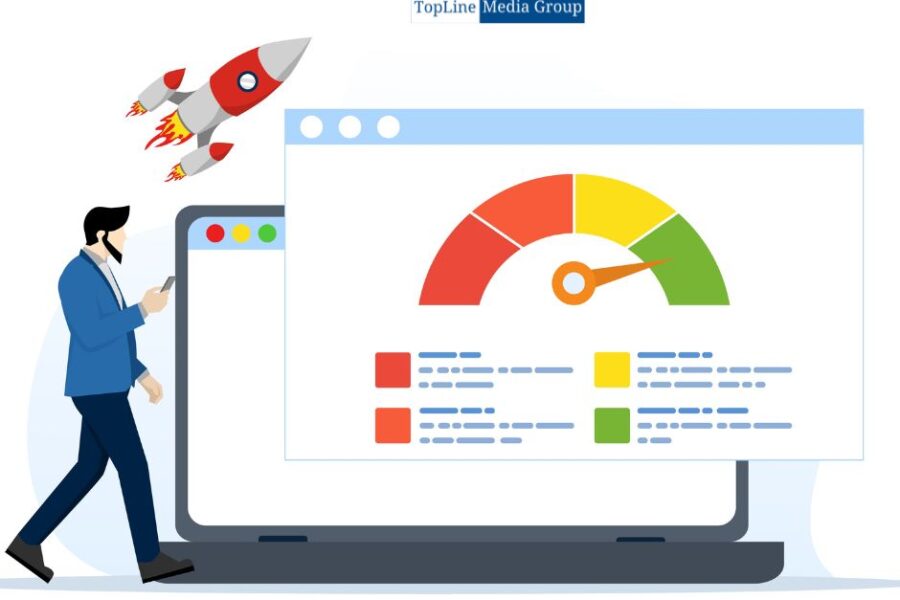Every second counts in today’s fast-paced digital world.
A single momentary delay in the loading of a website may well be enough time to make the user hit the back button and look for alternatives.
This is what businesses often miss in the scenario: optimizing website speed.
A fast website is important not only to keep visitors happy but also as a critical element that can significantly impact your site’s search engine rankings and conversion rates.
Understanding how site speed impacts user experience is of utmost importance for anyone looking to thrive online.
Let’s examine why optimizing your website’s speed should be the top priority.
What is Site Speed?
Site speed is the time taken for a web page to load so that it can fully interact with users.
This includes the latency from the first byte of data to reach the user’s browser and the time it takes for all images, scripts, and content to load on the screen.
Site speed depends on server response time, the size of the files, image optimization, and proper coding norms.
When optimized correctly, a site will load in under seconds on both desktop and mobile.
In an age where attention spans are reducing dramatically, every millisecond counts. Users expect seamless experiences that do not make them wait around.
Understanding site speed is, therefore, imperative for keeping engagement and satisfaction levels high among your audience.
Site Speed vs Page Speed
Site speed is how long it takes for your whole website to download, including images, scripts, and stylesheets.
It gives you an overall view of the site’s performance.
Page speed is focused on the time it takes for an individual page to download.
Each page may have different speeds based on what’s in it and how it’s structured.
Knowing the difference here helps in prioritizing which areas to optimize well.
Although both measures are crucial for user experience, they have different purposes in analyses and strategies.
An overall slow website impacts many pages while optimizing specific page speeds can yield quick wins for targeted traffic sources or campaigns.
The best balance of both is the key to optimal performance.
Importance of Website Speed

Website speed is also crucial in making sure the online experience is as terrific as possible.
This is expected to open pages fast, and any delay will be frustrating to your users.
A slow site may lose visitors before reading what you’d have to say.
Search engines like Google rank fast-loading sites higher.
If your website is optimized for speed, you can avoid getting buried under competitors who can deliver better performance.
This can severely impact your visibility and traffic.
Moreover, a website’s speed directly affects conversion.
A slow website may prevent customers from concluding purchase or membership with the service.
Ensuring quick load times improves user satisfaction and hence boosts the bottom line at conversion.
1. High speed ensures an impressive user experience
How fast your site loads is essential to the user experience. When the loading speed is quick, visitors find it easy to search for what they want.
Users stay interested and continue exploring a fast-loading site.
Slow sites frustrate visitors; they leave before seeing what you have.
This impatience would allow businesses to capture that customer’s interest.
In this day of instant gratification, optimizing your website’s speed is key.
Users will likely return if the first visit is convenient and not a hassle.
Speed attracts and maintains visitors, making it an important feature of any successful online presence.
2. Speed affects a website’s SEO rankings
Website speed has also become an important ranking factor on search engines.
Google, for example, prefers sites to load faster and includes the speed of their site in the ranking signals.
If your site loads quickly, it may affect its search engine visibility.
Slow-loading sites are frustrating for users, but they also tend to increase bounce rates significantly.
Search engines notice visitors who leave before interacting with the site’s contents; perhaps your site doesn’t provide a good user experience.
As competition increases among online businesses, optimizing site speed is essential to differentiate it in SERPs. Spending time on load times can help your site achieve better rankings and more organic traffic.
3. Speed affects conversion
Site speed plays a vital role in setting conversion rates.
Studies show that even a one-second delay can result in significant user engagement. Drops.
When visitors get the instant access they expect; delays can surely frustrate them, prompting them to leave the site.
The faster your website loads, the more opportunities a user will have to complete purchases or sign up for services.
An easy experience promotes trust in your brand for customers. When pages load quickly, potential buyers feel confident when they navigate through options without interruption.
Not only that but also fast page-loading sites improve customer satisfaction.
Satisfied visitors revisit and share with others about your site, thus increasing organic growth in the long run.
And so, it is crucial to prioritize website speed optimization to achieve maximum conversion and overall success within the digital landscape.
4. Reduced Abandonment Rates
A quick-load website may potentially minimize abandonment rates dramatically.
Fast sites would not frustrate and discourage users thus instead of burning those precious seconds they leave before checking their content.
A visitor ready to buy is met with frustrating delays.
They probably will leave their cart and look elsewhere, which means not only lost sales but declining faith in your brand as well.
Fast load times make the site look inviting to users, thus increasing the likelihood of staying much longer.
Visitors will explore a product or service further instead of clicking away with frustration. Optimizing the website to speed up performance reduces abandonment rates, which is wise for any business targeting a successful web presence.
5. Mobile Performance
Mobile performance is crucial in this new digital world.
As people increasingly access websites via mobile, a slow-loading mobile site could bid farewell to your website.
Customers only have a little time for slow mobile sites: they could lose you as you try to find instant answers for them in self-service.
Google favors websites that provide a seamless experience on all platforms, especially mobile. A slow-loading site may impair your ranking and visibility in search results.
Optimizing for mobile speed also helps with SEO and boosts user satisfaction.
An impatient consumer, too, browses on a phone.
A time delay of a few seconds may cause irritation and exit.
Optimal loading on a mobile device will definitely keep visitors engaged in your offerings and exploring further.
Testing Website Performance
Testing a website’s performance is key to knowing how well it will actually work.
Tools such as Google PageSpeed Insights, GTmetrix, and Pingdom help with understanding loading time and areas for improvement.
All these platforms provide detailed reports about some key speed metrics.
However, regular testing helps monitor all changes over time.
Other elements that may influence performance include image size, server response time, or script execution.
By checking these aspects frequently, you can always ensure optimal functionality.
Consider user feedback during testing.
Real users mostly find issues that automated tools would not.
By involving them, you’ll be in a position to suggest optimum speed optimization techniques suitable to your target website by their expectations.
Increase website speed
Increasing website speed improves user experience and boosts SEO performance.
Start by compressing images without sacrificing quality so the load time is reduced. Large files are slow sites, so this is a must-do in the first instance.
Then, minify the CSS, JavaScript, and HTML files.
Removing unnecessary space and comments reduces lines of code and, therefore, speeds up loading. This simple technique makes a difference in how fast pages render.
Leverage browser caching. For some data to be stored locally on devices cuts down repeated downloads on subsequent visits.
This improves speed, and visitors will come more often without frustration over long load times.
Understanding the Connection: Page Speed, SEO, and Conversions
Page speed, SEO, and conversions are symbiotic.
Improved page loading speed not only positively impacts the end user but also tells search engines that your site is reliable and well-optimized, which can then lead to better rankings in search engine results.
Users leave the page before it fully loads when they are waylaid by slow page loading times. So, faster pages accelerate visitors’ stay on the page and hence even conversion chances—any second matter in grabbing the attention of potential customers.
Google favors sites that load fast in its ranking algorithms.
Speed optimization helps increase your ranking on search engine result pages and makes the space more hospitable for users to explore and convert smoothly.
Effect of Page Speed on User Experience
Page speed significantly determines user experience.
If your website loads quickly, visitors will likely linger and interact with your content.
Slowing page loads may irritate and lead users to leave their search for information or products.
A smooth navigation experience will allow users to explore and linger on various areas of your site. Fast page loads create a setting where customers feel appreciated and understood.
This satisfaction plays a critical role in retaining visitors.
A website gains trust much faster.
Users associate speed with professionalism and reliability.
If they find your site efficient, they will likely perform the desired actions—working out something there—by subscribing to the newsletter or purchasing.
Conclusion
Website speed optimization is one of the most important things that can determine the overall performance of your online presence.
The more impatient users are, the more lost opportunities and revenue could be due to slow-loading sites.
It’s time for people to realize how experience is directly affected by speed.
This also means that search engines favor websites which load up faster, so when it comes to latency, they are definitely there. In an optimized website, not just people but the people tend to stay there because they like it.
Whereas an investment in the site speed goes beyond the technical aspect, it is to create an atmosphere whereby a visitor feels valued and satisfied.
Therefore, when speed matters, users trust it, explore it, and give a better business outcome in the long run.
It is also worth noting that search engines prefer faster websites, so when it comes to delays, they are very much there. In an optimized website, not just people but the people tend to stay there because they enjoy it.
The investment made in website speed optimization in digital marketing success. it helps to create an atmosphere where the visitor feels valued and satisfied.
So, when the matter of speed stands in good terms, it gains users’ trust, they explore, and eventually give a better business outcome in the long run.
FAQ
How does site speed affect SEO?
Internet search engines favor fast-loading sites. A slow site may possibly rank lower due to the favorable conditions offered by search algorithms to sites that give quicker access to the content.
What tools should I use to measure my site’s speed?
The PageSpeed Insights from Google, GTmetrix, and Pingdom help measure a page’s loading time and provide actionable insights.
Do I have to know coding to improve my site’s speed?
Yes! Most solutions have plugins or built-in capabilities that can help optimize images, cache content, and script management without much-advanced coding.
Is there a perfect load time for websites?
There isn’t an ideal size for a one-size-fits-all answer, but under 3 seconds is usually recommended. The faster, the better!
What’s the importance of mobile performance in website speed overall?
Mobile users will also expect pages to load quickly. Optimizing for mobile can significantly improve the experience across devices.
Businesses can effectively tap into these aspects of website speed optimization by being aware of these aspects.



